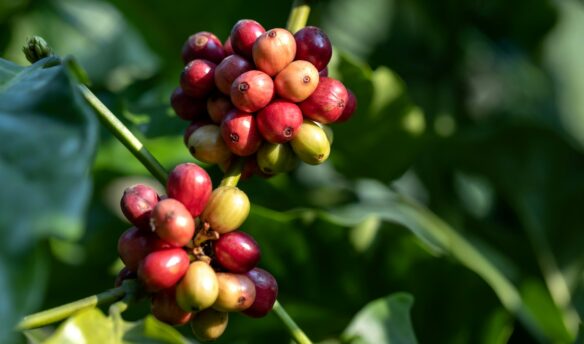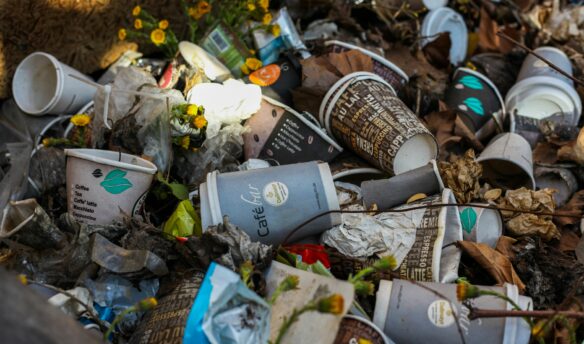Happy International Workers’ Day! The NLRB hits Starbucks with another failure to bargain complaint. Plus, Gesha is the coffee of choice for the US Barista Championship competitors, and San Francisco cafes would like you to take your coffee to go, please.
📩 Get the latest coffee trends in your inbox weekly—subscribe here.
‘Starbucks Refused to Negotiate Fairly at 144 Unionized Cafes, US Labor Board Alleges’ – via Bloomberg
As it’s May Day, or International Workers’ Day, let’s start with news of the latest allegations leveled at Starbucks by the National Labor Relations Board. In a new complaint, the NLRB’s regional director in Seattle alleged that the company “failed and refused” to bargain with 144 newly-unionized stores “with no intention of reaching [an] agreement” with the union.
After workers win a union vote—a complex and protracted process that Starbucks has fought every step of the way—the following contract negotiation can take months if not years. The NLRB says that Starbucks illegally drew out the bargaining process by “insisting upon proposals that are predictably unacceptable to the union” and “demeaning and otherwise undermining the union’s chosen representatives.”
Starbucks denies the allegations, pinning the blame for the slow negotiations on the union. A spokesperson said the union has “consistently engaged in conduct that has unnecessarily delayed progress toward first contracts.”
The first collective bargaining sessions between the company and newly-victorious union members were scheduled for October 2022, but as soon as they began, Starbucks representatives walked out, citing disagreements over union negotiators joining the meeting via Zoom.
This isn’t the first time the NLRB has taken the coffee giant to task over its failure to negotiate. In December 2022, the same Seattle office wrote that Starbucks “has been failing and refusing to bargain collectively” with stores in cities including Portland and Seattle. Starbucks denied those allegations as well.
Read the full story on Bloomberg here or at Yahoo! News here.
‘4 Out Of 6 US Barista Finalists Used A Gesha (But Not The Champion)’ – via Sprudge
The US Coffee Championships took place this April during the Specialty Coffee Association’s Expo in Portland last week. The winners will compete against coffee champions from around the world later this year: the 2023 World Barista Championship, the World Brewers Cup Championship, the World Cup Tasters Championship, and the Cezve/Ibrik Championship will take place in Athens in June, while the 2023 World Latte Art Championship, World Coffee in Good Spirits Championship, and World Coffee Roasting Championship will take place in Taipei in November.
Alongside competitions in roasting, tasting, brewing, mixology, and latte art, the barista competition showcases the pinnacle of the profession—and more than ever, that showcase revolves around unique coffee varieties and experimental processes.
Half of the semi-finalists and four of six finalists utilized the prized Gesha variety in their routines, with many using coffee that had undergone anaerobic fermentation, a processing technique where the coffee cherries are sealed in an oxygen-deprived chamber during the fermentation stage.
Gesha didn’t claim the top spot, however. The winning coffee used by Isaiah Sheese of Archetype Coffee was a Pink Bourbon from Guatemala that had undergone a proprietary “thermal shock” processing—where, after fermentation, the cherry is washed in first hot and then cold water. Although his coffee was grown in Guatemala at Finca Buena Vista, the thermal shock process was handled by Diego Bermudez from El Paraiso in Colombia.
‘In 2023, San Francisco Coffee Shops Want You to Get the Hell Out’ – via Eater
It’s probably an understatement to say that the coffee shop landscape has changed since 2020. Numerous cafes closed completely, while others focused on coping with slower foot traffic. Many pivoted to a takeout-only model, and judging by this report from Eater San Francisco, many are staying that way.
Starbucks removed tables and chairs from several downtown locations in the California city, causing a backlash amongst customers and workers, while Peet’s Coffee is opening its first to-go-only store in town. According to Peet’s CEO, Eric Lauterbach, the company adopted a takeout-only model due to a shrinking city population and changing attitudes towards cafes in general. “Post-pandemic, people are using coffee shops differently,” Lauterbach says. “I’ve been at Peet’s 13 years, and feedback used to be that the chairs weren’t comfy enough since people wanted to stay awhile. Now our mobile transactions are north of 20 percent.”
It’s not mentioned in the story, but San Francisco has some of the highest commercial rents in the country, which might make smaller spaces a more attractive option for coffee companies large and small.
Another change fueling cafes to encourage customers to move along is also pandemic-related: the massive increase in remote workers. Many who work from home don’t actually want to work from their homes, instead turning to coffee shops. In the Eater piece, one cafe is referred to as a “zombieland” due to the number of headphone-swaddled tech workers camping out in silence—aside from the odd conference call, of course.
These laptop campers can hurt cafes that rely on constant turnover for income. The piece presents a few simple rules for being a good customer—which seems strange to have to do in 2023, but perhaps people need reminding: “Respect baristas and treat them as human beings, of course, followed by respecting the space itself. It’s not your home office, and if there’s no outlet don’t be offended; bring a portable battery or hot spot.”
More News
‘The World Barista Championship Is Heading To Busan In 2024’ – via Sprudge
‘Britain Signs Global Coffee Agreement in Bid to Boost Industry’ – via Reuters
‘Pret A Manger to Increase Cost of its Coffee Subscription by 20%’ – via Financial Times
‘Judge Approves $12 Million Settlement in Kona-Led Class Action Case’ – via Daily Coffee News
‘Is The Meticulous Espresso Machine Going To Be The Most Funded Food Kickstarter Ever?’ – via Sprudge
‘Colombia Coffee Growers Elect New Leader Amid Production Challenges’ – via Nasdaq
‘Here Are the 16 Winners of the Good Food Awards for Coffee’ – via Daily Coffee News
The Week in Coffee Unionizing
Starbucks stores across the US and Canada will hold two-hour “connection” sessions between managers and employees, including coffee tastings, group activities, and a video from new CEO Laxman Narasimhan. These meetings will not address operational issues but instead “focus on connection and Starbucks’ role in bringing people together,” according to the company.
The sessions aim to address “heightened tensions between some baristas and executives,” according to Business Insider. “Starbucks has a long history of bringing together partners to explore opportunities to evolve and modernize the business, brand, and culture to meet the needs of the day and, importantly, the future of the company,” a Starbucks representative said.
“If Starbucks really wanted to connect with its partners, it could meaningfully participate in bargaining with workers at the more than 300 stores who have joined together and voted to form a union,” Starbucks Workers United said in response.
The Week in Corporate Coffeewashing
Nestlé, the Swiss multinational owner of Nespresso, Nescafé, Blue Bottle Coffee, and Dolce Gusto, among other coffee brands, is partnering with the aerospace company Airbus to use satellites to monitor reforestation rates in Thailand. The move is part of Nestlé’s 2050 net zero emissions goal.
The company aims to plant and grow 200 million trees throughout its supply chain by 2030, which Airbus’s new Pléiades Neo satellite will monitor to ensure that the trees continue to grow throughout the project’s lifespan. “Our goal is to remove 2 million tonnes of carbon dioxide equivalent through these projects,” according to Magdi Batato, Nestlé’s Executive Vice-President and Head of Operations. “Growing trees close to our sourcing locations is an essential part of our climate roadmap alongside decarbonising our operations and supply chain.”
Nestlé, the world’s largest publicly held food company with over $99 billion in revenue in 2022, has a huge carbon footprint and has been at the center of a litany of environmental controversies, from water and plastic pollution to deforestation linked to palm oil and cocoa.
While planting more trees sounds like an undeniable good, corporate tree planting has been criticized as another form of greenwashing, throwing money at a problem without understanding local nuances of biodiversity or habitat suitability. They’re often treated as another form of offsets, which, as we’ve discussed before, are often riddled with problems. Then there’s the issue of space: as an article in the Guardian notes, “Planting trees to offset carbon emissions sounds great, but where are we going to put them all?”
Hopefully, Nestlé’s afforestation program, with the help of satellites, is more than a simple box-ticking exercise.
Beyond the Headlines
‘Exhausted Memories Of The 2023 SCA Expo’ by Jordan Michelman
‘The Accidental Coffee Farmer’ by Fionn Pooler
‘2023 Was The Year Of The Milk Course At The US Barista Championship’ by Zac Cadwalader
‘The 2023 Specialty Coffee Expo Gadget Guide’ by Anne Mercer
















